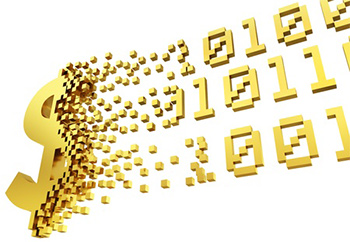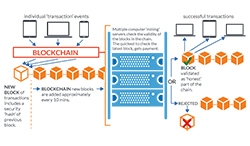 Digital currency. The words are enough to strike fear into the heart of many small business owners. It’s not as if you don’t already have enough to deal with, and the risk that you might now have to learn to use a new form of currency is daunting.
Digital currency. The words are enough to strike fear into the heart of many small business owners. It’s not as if you don’t already have enough to deal with, and the risk that you might now have to learn to use a new form of currency is daunting.
Here’s a primer on what digital currency (also known as crypto currency) and how you can expect it to affect your business over the next few years.
Understanding the blockchain concept
The “blockchain” was developed in 2008 and is a digital ledger that stores data in records called blocks. Each block is linked to the one before it and to the one following it. This gave rise to the “chain” part of the name.
“A blockchain is a decentralized and distributed digital ledger that is used to record transactions across many computers so that the record cannot be altered retroactively without the alteration of all subsequent blocks and the collusion of the network.” - Wikipedia
[quotes]Every block or record is individually secure and impossible to alter once it is created,[/quotes] and each new block added to the chain helps verify the action that took place in the preceding one.
 The Open Univ. - Click for Full Image & Excellent ArticleThe end result is a connected set of records showing every transaction in the sequence, which cannot be deleted or changed in any way.
The Open Univ. - Click for Full Image & Excellent ArticleThe end result is a connected set of records showing every transaction in the sequence, which cannot be deleted or changed in any way.
The technology has future implications beyond its use as a currency, ultimately, these may prove to be even more valuable to businesses.
Blockchain is used for processing other types of secure digital transactions between parties, such as:
- Automation of escrow for real estate and online contract payments,
- Borderless banking transfers,
- Peer-to-peer payments to reduce overhead costs,
- Load tracking in the supply chain and logistics industry,
- Management of connected appliances across the Internet of Things, and
- Secure storage and sharing of confidential records.
[quotesright]The blockchain is ideal for the secure transfer of money and sensitive data, [/quotesright] without the need for a bank or other intermediary to process the transaction. The software is browser-based and free, so users don’t need to spend any money downloading an application, it’s always up to date and nobody owns it.
What is Digital Currency and How Does It Work?
Blockchain was originally developed to underpin Bitcoin, but more than 900 other digital currencies now use it too. Below are five biggest of these.
- Bitcoin, now called Bitcoin Core, was the first crypto currency to be created and is still the biggest trader. Launched in 2008, its inventor, Satoshi Nakamoto, remains a mystery figure who has never been identified. Bitcoins are currently worth more than $4,000 each and are rapidly developing into a digital investment vehicle rather than a transactional one, with secondary layers and associated fees.
- Ethereum is a decentralized platform that runs smart contracts on a custom-built blockchain infrastructure. These are applications that run exactly as they are programmed without any risk of downtime, censorship, fraud, or third-party interference. Ethereum also has a smart wallet where you can hold and trade secure assets.
- Bitcoin Cash, an offshoot of Bitcoin born in August 2017, works the way Bitcoin did until recently as a transactional currency. At the time of the fork, users who owned Bitcoin were credited with an equal amount of Bitcoin cash.
- Ripple is a distributed electronic ledger that functions as a real-time gross settlement system (RTGS), digital currency exchange, and remittance network.
- Litecoin is very similar to the original Bitcoin and now to Bitcoin Cash, with almost zero payment cost. It enables payments to happen approximately four times faster than Bitcoin, which is the reason for its popularity and growth.
How Does Crypto Currency Work?
[quotesright]Each transaction is a transfer of value between users’ digital wallets. [/quotesright] The transfers are recorded in the blockchain, and each wallet retains a secret piece of data called a private key. The key is used to sign the transaction and provide proof of the sender and receiver’s identities, and once signed the transaction can’t be altered.
The sharing and deciphering of the transaction blocks by the sender and receiver is called mining, and [quotes]it enables you to send or receive money or information without using a bank,[/quotes], PayPal or other third party that charges a fee.
[quotesright]Bitcoins and other currencies have their own exchange value against the dollar, [/quotesright] which fluctuates just as physical currencies do.
Benefits
The main benefits of using digital currency are:
- Security,
- Lower costs associated with transactions, and
- The ability to avoid currency exchange rates and charges.
Disadvantages
There are downsides however, including:
- Largely Unregulated at the present. Digital currencies, or cryptocurrencies, are currencies used as a means of exchange without the backing of a third party.
- The volatility of the currency. There is no set value for a coin, it’s like a stock, what buyers and sellers determine from moment to moment so it can be highly volatile. Professor Campbell Harvey at Duke University says it’s extremely risky and 5 times as volatile as the S&P.
- Not all vendors and individuals are set up to use digital currency as yet.
However, we are rapidly seeing more online retailers like Amazon and Etsy offering payment in Bitcoin for users with the right app.
- Digital currencies are also currently unregulated and not accepted by some countries, although those are few.
- Previously, losses of digital currency occurred when one of the biggest traders, Japan-based Mt. Gox, lost around 800,000 bitcoins in 2013, but that turned out to be internal theft.
The future impact on business
[quotesright]The use of blockchain-based digital currencies have great potential in business, [/quotesright] particularly for small companies. Regardless of the type of products or services you offer, most businesses accept electronic payments already. If you can accept electronic fund transfers, PayPal transfers, or online credit card payments, there’s no reason why you can’t accept Bitcoin or one of the others.
Why bother?
As soon as you start accepting payments in cryptocurrencies you’ll begin to enjoy the advantages, including:
- Lower costs associated with money transfers, because of the absence of a third party such as a bank, credit union, or PayPal
- Faster access to money, because the transaction takes place in minutes instead of being “put on ice” while awaiting independent verification of a liability-averse third party.
- No government links, since crypto currencies are not “based” in any country there are no borders, taxes, international exchange rates, or government fees to consider.
- Avoiding disputes, because crypto currencies work like cash rather than credit. Once the payment is made, it’s made. Nobody can dispute it, there’s no way it can be missing, and nobody can stop it.
Blockchain is for more than payments
In addition to the payment benefits, [quotesright]businesses will be able to sign agreements with clients and suppliers using blockchain technology. [/quotesright] Once a contract is digitally signed this way, paper copies aren’t required because the digital record is unbreakable. It won’t be long either before systems can be set up to trigger certain actions on receipt of a signed contract via blockchain.
Getting Ahead of the Game
It’s a given that [quotes]small and medium-sized businesses find it harder to keep up with technological developments[/quotes] than the big companies, and the reasons are obvious. Usually, budget is the primary factor, followed by lack of time and shortage of human resources.
In the case of digital currencies, two out of three are irrelevant:
- Budget doesn’t apply because it costs nothing to switch to (or at least include an option for) crypto currency for your payments.
- Human resource requirements are minimal because all the work is done digitally. The same administrative employees who record payments received via PayPal and EFT will record payments received via Bitcoin, with the welcome difference that the funds will reach your bank account faster.
[quotes]Don’t wait until you lose clients before getting started with Bitcoin.[/quotes] Take your time, set up a digital wallet and play around with it for a while before you introduce it to your clients, so you’re coming from an informed position.
Even if it takes a while for your customers to adapt to using it, when you land that one big contract you’re waiting for and they want to pay with Bitcoin, you’ll be ready.
Resources you can use:
https://hbr.org/2017/01/the-truth-about-blockchain
https://blog.andplus.com/a-newbies-guide-to-blockchain
https://coinmarketcap.com/currencies/views/all/
https://hbr.org/2017/03/the-blockchain-will-do-to-banks-and-law-firms-what-the-internet-did-to-media
https://smallbiztrends.com/2017/08/bitcoin-and-blockchain-small-business.html?tr=sb_pop_tcs
https://cointelegraph.com/news/how-soon-blockchain-technology-will-change-currency-as-we-know-it
https://bitcoin.org/en/how-it-works
http://wallstreetpit.com/102032-the-serious-disadvantages-of-bitcoin-2/
http://bitcoinist.com/2-3-billion-people-use-bitcoin-amazon/
https://www.entrepreneur.com/article/287070
https://bitcoin.org/en/getting-started














